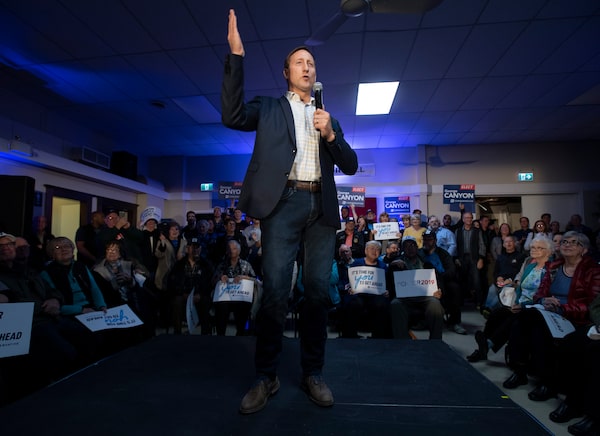Tom Flanagan is professor emeritus of political science at the University of Calgary and a former Conservative campaign manager.

Peter MacKay is well positioned to attract the suburban Ontario voters that the previous CPC leader had difficulty reaching.Adrian Wyld/The Canadian Press
Peter MacKay has decided to enter the race for leader of the Conservative Party of Canada (CPC); this is good for the party and good for Canada.
Readers will recall that Mr. MacKay was the newly chosen leader of the Progressive Conservatives (PCs) when he and Stephen Harper agreed in 2003 to put their careers on the line and merge the PCs with the Canadian Alliance. René Lévesque might have called it “le beau risque.”
Mr. MacKay was clearly ambitious, but he set aside his ambitions and decided not to run for the leadership of the new CPC. The decision also illustrated the hard-headed realism that has marked his career. He couldn’t have defeated Mr. Harper then, because the Canadian Alliance side was much more numerous, better organized and better funded. It was simply not Mr. MacKay’s time.
Instead, he accepted Mr. Harper’s offer to become deputy leader and for the next 10 years served loyally in three of Canada’s most important cabinet positions: minister of foreign affairs, minister of national defence and minister of justice and attorney-general. One can hardly think of better preparation to be prime minister than to have presided over these portfolios.
Coming from Nova Scotia and now living in Toronto, Mr. MacKay is well positioned to attract the suburban Ontario voters that the previous CPC leader had difficulty reaching. Yet he can also become an attractive figure in the West. He took a public stand in 2016 in favour of the now-abandoned Energy East proposal, writing that “pipelines present a modern-day equivalent of the Canadian Pacific Railway – John A. Macdonald’s visionary project.” If he stays with that position, he will get a positive response out here.
For Western Conservatives, the fate of the oil and gas industry dwarfs all other issues. If we can’t get a federal government that’s willing to allow the industry to grow and prosper, we may as well turn out the lights. But we can’t achieve that goal by ourselves because we are permanently outnumbered in Canada. We need allies from other parts of the country to help us make our case – people like Peter MacKay.
Of course, it may be hard for some of us who first became politically active in the Reform Party to accept a leader who is not from the West. But Preston Manning, the Reform Party’s founder and only leader, recognized that alliances were necessary to achieve Western objectives. Like Peter MacKay, he sacrificed his own leadership to build a larger party – the Canadian Alliance, and ultimately the CPC. Western Conservatives may have to be willing to make the same kind of gesture within the Conservative Party of Canada, to entrust their vital interests to a leader who understands what building bigger coalitions is all about.
But we don’t just need a leader who can make sacrifices; we need a winner to undo the damage that the Liberals have done to the West. Peter MacKay has been a political winner all his life, and he can be again. Indulge this retired campaign manager while he looks at the crasser side of a political matchup against Justin Trudeau.
Tall, handsome and athletic: check. Accomplished wife, adorable children: check. He speaks French and will work to improve, just as Stephen Harper worked on his French with a tutor. Relevant experience: far more than Justin Trudeau had when he became Liberal leader. Political pedigree: father was a minister in Brian Mulroney’s government. Experience other than politics: career as a lawyer both before and after service in Parliament.
Finally, Mr. MacKay should be able to avoid the attacks on social conservatism that dogged Andrew Scheer, what he memorably called the “stinking albatross” hung around Mr. Scheer’s neck. In 2006, Mr. MacKay voted against a motion to redefine marriage to exclude same-sex couples. Mr. MacKay’s vote now seems prescient. It can be the base from which he can knock the progressive media off their obsession with old quotes and back to the pressing problems that Canada faces, such as declining investment, stagnant productivity, structural deficits, and boiling anger in the West.